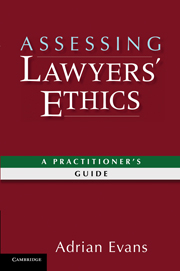Book contents
- Frontmatter
- Contents
- Preface
- List of figures
- Acknowledgements
- 1 An opportunity for law societies
- 2 Ethical failures, research and core qualities
- 3 Understanding ethical methods and types
- 4 Mechanisms to offset business pressure on legal ethics
- 5 Discovering practitioners' opinions about ethics assessment and psychological testing for integrity
- 6 Developing character
- 7 Measuring awareness of values and ethics
- 8 Entrenching ethics assessment
- Appendix A Research methods
- Appendix B Awareness of ethical type
- Appendix C Prototype scale of preference for legal ethical type
- Index
4 - Mechanisms to offset business pressure on legal ethics
Published online by Cambridge University Press: 10 January 2011
- Frontmatter
- Contents
- Preface
- List of figures
- Acknowledgements
- 1 An opportunity for law societies
- 2 Ethical failures, research and core qualities
- 3 Understanding ethical methods and types
- 4 Mechanisms to offset business pressure on legal ethics
- 5 Discovering practitioners' opinions about ethics assessment and psychological testing for integrity
- 6 Developing character
- 7 Measuring awareness of values and ethics
- 8 Entrenching ethics assessment
- Appendix A Research methods
- Appendix B Awareness of ethical type
- Appendix C Prototype scale of preference for legal ethical type
- Index
Summary
Virtuous lawyers as acute businessmen and women
Discussion of lawyers' ethical types and the confidence needed by a virtuous lawyer to consistently make ethically difficult decisions is one thing, but short-term business priorities of legal practice can undermine such determination. A common view among some lawyers, regulators and the judiciary is that law has become so business oriented that ethical lawyers of any type (other than zealous advocates) are as good as lost in space. Can any ethical system offer an alternative to the relentless culture of six-minute billing intervals and the allure of a faster route to partnership? While it is true that the legal professional must operate confidently and with considerable autonomy, constantly encountering inherently contentious ethical situations, those encounters need not involve irreconcilable differences. The virtuous lawyer is not a figment of the imagination. They are zealous when necessary, responsible to the courts and caring in the widest sense, seeking reform where that is needed, all the while gaining and building the trust of more clients than they lose as a result of occasionally having to say ‘no’. Many lawyers with this profile are conventionally successful in the law as well as engaged in their (legal) businesses because their focus is contextual, long term and courageous.
The misconception that sets ‘Law as a Business’ and legal ethics at complete odds with one another is pervasive, but it can be addressed if the so-called short-term business priorities of lawyers are examined and challenged.
- Type
- Chapter
- Information
- Assessing Lawyers' EthicsA Practitioners' Guide, pp. 92 - 125Publisher: Cambridge University PressPrint publication year: 2010

